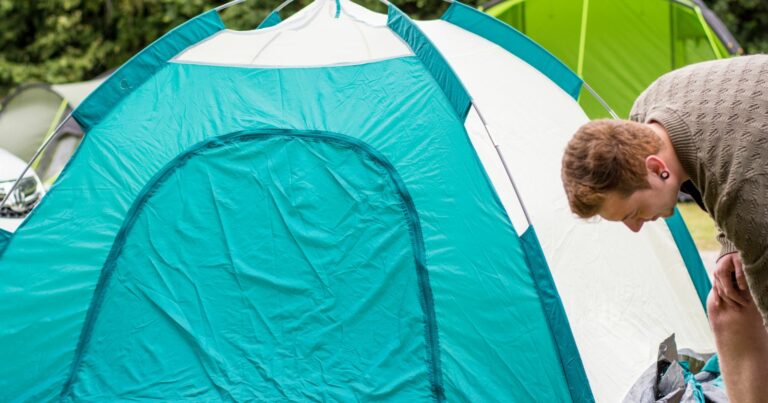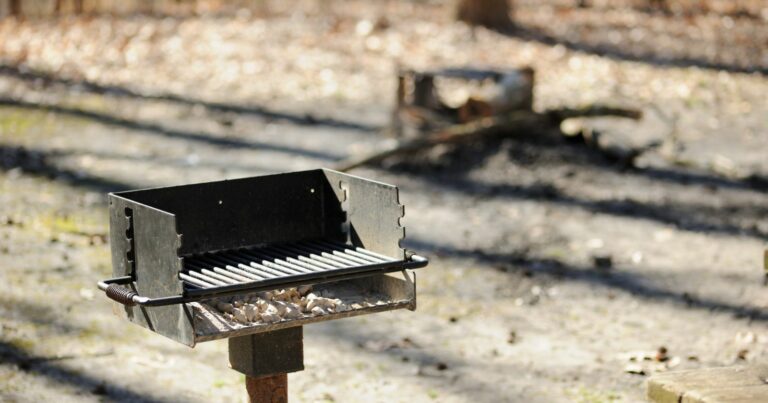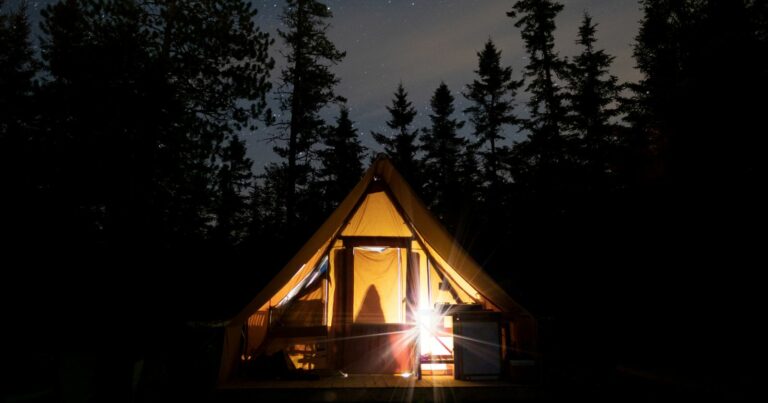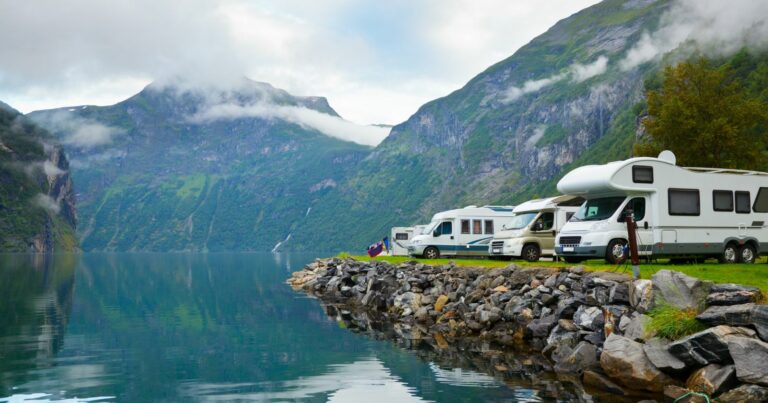Can I Start a Campground on My Land? A Complete Guide
Have you ever dreamed of starting your own campground? Do visions of happy campers gathered around a crackling fire under the stars fill your head? If so, you’re not alone. Many people fantasize about opening a campground on their own land.
But while starting a campground can be an extremely rewarding endeavor, it’s also a major undertaking that requires careful planning. Jumping in without doing your homework can lead to wasted time, money, and frustration down the road.
In this article, we’ll walk through the key steps and considerations for starting a campground on your property. We’ll look at the permits needed, startup costs, site planning and development, staffing, marketing, and more.
Follow along for a practical guide to making your campground dreams a reality. With smart preparation and persistence, you can create a successful camping business that provides lasting memories for families and nature lovers.
The journey starts with a thoughtful business plan. First, pinpoint the type of campground you want to operate. Do you envision barebones tent camping or RV sites with full hookups? Will you target a niche like glamping or backcountry tents? Your vision will shape every decision that follows.
Next, crunch the numbers. Talk to your county to understand permit and code requirements. Research build-out and operating costs. Identify potential funding sources. Creating a detailed business plan will set you up for success.
While it takes serious work, starting a campground can enable you to turn your passion into a livelihood. With grit and smart planning, your land can become a basecamp for unforgettable adventures. Let’s get started!
Pinpoint the Type of Campground You Want to Open
The first step is deciding what kind of campground you want to operate. The possibilities span a wide spectrum:
- Tent camping – Simple sites for pitching tents, with shared restroom facilities. Minimal infrastructure needed.
- RV camping – Paved sites with utility hookups for RVs. More significant upfront investment required.
- Backcountry camping – Remote, rugged sites reachable only by hiking. Caters to more adventurous campers.
- Glamping – Furnished tents, cabins, and yurts, with amenities like beds, electricity, and sometimes en-suite bathrooms.
- Specialty camping – Catering to a niche like horse camping, family camping, eco-friendly camping, etc.
Pinpoint the type of camping experiences you want to create. This will inform every decision about layout, amenities, capacity, staffing, and budget.
Create a Detailed Business Plan
Once you’ve identified the type of campground, it’s time to start planning in earnest. A detailed business plan is essential for success. Your business plan should include:
- Startup budget – Research and outline costs for property purchase/preparation, permits, utility setup, road and amenity construction, insurance, staffing, marketing, etc.
- Operating budget – Estimate ongoing costs like maintenance, utilities, supplies, payroll, etc.
- Market analysis – Research demand in your region, comparable facilities, target customer demographics and preferences, pricing, etc.
- Financial projections – Make income and cash flow projections. Calculate your breakeven point.
- Funding plan – Identify how you will fund startup costs and early operating losses. Look into small business loans/grants.
- Organizational structure – Figure out legal business structure, management hierarchy, staffing levels, outsourcing needs, etc.
- Risk assessment – Identify potential challenges and risks, and create contingency plans to address them.
A complete business plan allows you to enter your new venture with eyes wide open. It also shows lenders and investors that you have thoroughly planned.
Secure Funding for Your Campground
With a business plan in hand, you can start looking for funding sources to get your campground up and running. Some options to consider:
- Small business loans – Government-backed loans like SBA 7(a) and USDA loans can provide favorable rates/terms.
- Business lines of credit – Revolving credit lines allow flexibility to access funds as needed. Useful for managing cash flow.
- Crowdfunding – Platforms like Kickstarter and Indiegogo allow you to raise smaller investments from many backers.
- Business partners – Consider bringing on an investor or partner who can provide startup capital.
- Personal loans – Banks and online lenders offer personal loans that can provide startup funds.
- Home equity loan – Leverage your home equity to access funds at competitive rates.
- Credit cards – Business credit cards can help cover smaller startup costs.
With an array of funding options, you can get the capital you need to turn your campground dream into reality.
Research Regulations for Your Area
Once you have a handle on funding, it’s crucial to understand the legal and regulatory requirements to open a campground in your location. Key areas to research:
- Zoning laws – Make sure a campground is permitted on your property’s zoning classification. Seek rezoning if needed.
- Permits and licenses – States and counties often require specific permits/licenses for campgrounds. Apply well in advance.
- Health and safety codes – Ensure your campground plans meet local health codes for food service, water, sanitation, etc.
- Accessibility codes – Make sure your amenities comply with ADA and accessibility legal standards.
- Environmental impact studies – New construction may require environmental assessments.
- Insurance requirements – You’ll need commercial general liability insurance at minimum. Work with an agent experienced in campground coverage.
- Business registration – Register your campground business with state/local agencies.
- Taxes – Understand if you need to collect/remit sales tax, lodging tax, etc. Stay compliant.
Doing your homework on legal and regulatory issues upfront prevents headaches later on. Consult local government agencies, real estate attorneys, and insurance agents during the planning process.
Design and Build Out Your Campground
Once your business plan is approved, the permits are in order, and the funding is secured, it’s time for the fun part – designing and building your campground!
Choose and Prepare Your Site
- Survey your land and identify the best locations for camping areas, access roads, amenities, and utilities.
- Clear brush, grade the land, fill any low spots, etc. to create flat, usable campsites and roads.
- Install site utilities like electricity, water, septic/sewer, and communications lines.
- Construct any necessary buildings for check-ins, supplies, staff housing, activities, etc.
Design Your Campground Layout
- Map out camping areas, internal road networks, pedestrian paths, parking, and amenities.
- Designate tent, RV, group, and accessible sites. Allow ample spacing for privacy.
- Situate amenities like showers, restrooms, laundry, community areas, and recreational facilities conveniently.
- Create a welcoming main entrance with signage and an office/check-in area.
- Set aside open areas for campground programs, events, and activities.
Construct Campground Amenities
- Build restroom and shower facilities with hot water and anti-slip features.
- Create recreational amenities like pools, sports areas, playgrounds, trails etc.
- Install picnic tables, fire rings or grills, food prep areas, water spigots, and trash/recycling stations at sites.
- Set up tents, cabins, and RV sites with utility hookups if applicable.
- Ensure accessibility features like widened roads, accessible sites, and ADA restrooms.
With thoughtful site planning and design, you can create a fun, convenient, and comfortable campground your guests will love.
Staff Your New Campground
Once the infrastructure and amenities are in place, you need to hire and train staff to operate your new campground. Some key roles you may need to fill:
- Campground manager – Oversees daily operations, financials, marketing, staff supervision.
- Office staff – Handles reservations, check-ins/checkouts, customer service.
- Maintenance staff – Maintains facilities, performs repairs, handles emergencies after hours.
- Housekeeping – Cleans restrooms/showers, removes trash, restocks supplies.
- Recreation staff – Plans and leads campground activities and programs.
Look for people with hospitality experience. Campground hosts who live on-site seasonally are great for providing security and customer service. Invest time into training staff on company policies, safety, and delivering excellent service.
Market and Promote Your Campground
You’ve built an amazing campground – now it’s time to spread the word so people can enjoy it! A multifaceted marketing and promotion strategy is key.
- Create a website – Showcase your campground and allow online reservations.
- Claim online listings – Register your business on sites like Google, TripAdvisor, RV parks listings, etc.
- Run social media ads – Target your region and customer demographic with Facebook/Instagram promotions.
- Partner with tourism boards – Work with local agencies to promote your campground. Offer discounts for their referrals.
- Print brochures – Distribute brochures at welcome centers, outdoor retailers, events, etc.
- Offer discounts and packages – Run specials and bundles to incentivize bookings.
- Host open house events – Invite the community to check out your new campground.
- Join industry groups – Networking with camping associations bolsters your credibility.
Spread the word far and wide. With smart marketing, you’ll steadily build awareness and happy campers.
Opening Day! Welcome Your First Guests
After months of hard work, opening day is here – it’s time to officially open your campground for business! Here are some tips for opening day:
- Host a media event for local news coverage. Offer tours of your impressive new campground.
- Roll out the red carpet for your first arrivals. Offer a little gift or memento of their inaugural stay.
- Have all staff on hand to ensure everything goes smoothly.
- Personally greet guests and get their feedback about their stay.
- Address any opening day hiccups immediately and learn from them.
- Celebrate this huge accomplishment with your team – you did it!
The long hours and hard work invested will pay off as happy campers start rolling in. Congratulations on achieving your campground dream!
Maintaining a Successful Campground
The work doesn’t stop once your campground is up and running. Ongoing maintenance and smart business practices keep your campground thriving for the long haul.
Maintain Facilities Diligently
Regular upkeep prevents problems down the road.
- Conduct daily site cleanups – empty fire pits, restock firewood, remove trash.
- Clean restrooms, showers, and laundry facilities thoroughly each day.
- Perform preventative maintenance on buildings, utilities, and recreation equipment.
- Monitor sites and amenities for safety issues and make repairs promptly.
- Do seasonal deep cleaning and necessary repairs during off-peak times.
Well-kept facilities entice return visits from delighted guests.
Cultivate 5-Star Customer Service
Excelling at customer service helps your business stand out.
- Hire and train employees who deliver consistent, high-quality service.
- Make guests feel welcome from check-in to checkout.
- Be available to address any guest needs or concerns.
- Send surveys to get feedback and identify areas for improvement.
- Reply promptly to online reviews and rectify any complaints.
- Thank guests after their stay and invite them to book again.
Exceptional service turns first time visitors into lifelong loyal customers.
Actively Manage Finances
Ongoing financial oversight ensures your business stays profitable.
- Track income and expenses in accounting software. Break out costs by category.
- Analyze financial reports to identify successes and problem points.
- Review fees and rates yearly and adjust as needed.
- Work with an accountant to stay tax compliant.
- Explore ways to improve efficiency and cash flow.
- Watch for new funding sources and financing to fund future projects.
Healthy financial management allows your campground business to thrive.
Market Strategically
Consistent marketing keeps a steady stream of site bookings coming in.
- Refresh your website and update photos regularly.
- Engage guests on social media with photos, videos, special offers, etc.
- Run targeted promotions during slower booking periods and to fill last-minute cancellations.
- Advertise in tourism magazines, blogs, and event listings.
- Send email newsletters to announce events, new amenities, and travel deals.
Savvy marketing tactics will boost visibility and fill sites year after year.
By pairing top-notch facilities and service with sound business practices, your campground will deliver memorable experiences that keep families coming back year after year. With a bit of pre-season freshening up each year, your thriving campground will be around for future generations to enjoy.
Frequently Asked Questions
Q: How much does it cost to start a campground?
A: Startup costs vary widely based on size and amenities, but plan on $180,000 – $450,000+. Major expenses are property purchase/prep, utilities, construction, insurance, staffing, marketing.
Q: What size property do I need for a campground?
A: Recommended minimums are 10 acres for tent camping, 25 acres for a full service RV park. Ensure enough space for sites, roads, amenities, open areas.
Q: What kind of profit margins can a campground generate?
A: Established campgrounds realize 25-35% profit margins on average. Margins are higher for simpler tent sites and lower for sites with full utilities.
Q: Do I need a college degree to run a campground?
A: While not strictly required, hospitality or business education gives helpful skills. Most important is experience, business sense, and providing great customer service.
Q: Should I buy an existing campground or start my own?
A: Buying an existing campground can reduce upfront costs and time. But starting your own allows you to control design. Evaluate locations and opportunities in your region.
Q: What should I charge for campground fees?
A: Check rates of other campgrounds in your area and price competitively. Average rates range $25-$85 per night, with full hookup RV sites on the upper end. Discount for weekly/monthly stays.
Q: How much staff do I need for a campground?
A: Numbers vary based on size. Typical minimum is 2-3 year round for office and maintenance. Plus seasonal housekeeping and recreation staff. Many campgrounds are family run.
Q: What are the most important campground amenities?
A: Modern restrooms, accessible sites, laundry, WiFi, and recreation facilities (pool, trails, playground, etc). RV sites should have full hookups. Fire pits/grills, picnic tables at every site.
Research carefully, start small if needed, and lean on the expertise of other local campground owners. With dedication, you can create a rewarding campground business on your land. The outdoors awaits – time to go camping!







